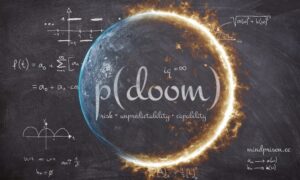Future Day 2025 was a great success – many thanks to the participants and those who dialed in!

Anders Sandberg – Living inside the cyborg leviathan: artificial intelligence from the 17th century to the posthuman future

Tyranny Multipliers and Moral Machines

Questioning Assumptions About Human Reasoning in Debates About AI Reasoning
Review – After the Spike: Population, Progress, and the Case for People

Future Day 2026

Claude’s Soul

Valence Realism, Consciousness, and AI: A Conversation with Andrés Gómez-Emilsson

Countering the Evolutionary Debunking Argument with David Enoch

Gemini Won a Math Olympiad – Should AI Compete in a Moral Olympiad too?

Can AI Be More Moral Than Humans? DeepMind’s Co-Founder Thinks So.

AI as a Moral Hypothesis Generator with David Enoch

Can AI Help Us Discover Real Moral Structure? A Critical Realist Hunch

Moral Realism for EAs

AI Ethics in the Shadow of Moloch: Why Metaethical Foundations Matter

p(Doom) Watch – Different Experts Probabilities of Doom from AI

AI Outscored Humans in a Blinded Moral Turing Test – Should We Be Worried? Dr Eyal Aharoni Explains
Here we grapple with a number of fascinating topics, including:
Epistemology – which questions what knowledge is and how it can be acquired, and the extent to which knowledge pertinent to any given subject or entity can be acquired. Much of the debate in this field has focused on the philosophical analysis of the nature of knowledge and how it relates to connected notions such as truth, belief, and justification.
Philosophy of Science – a branch of philosophy concerned with the foundations, methods, and implications of science. The central questions concern what counts as science, the reliability of scientific theories, and the purpose of science. This discipline overlaps with metaphysics, ontology and epistemology, for example, when it explores the relationship between science and truth.
Unprecedented Technological Growth – Over the last few decades we have seen unprecedented technological change. Our ability to visualize impacts of technological convergence in the short, medium and long term is detrimental to our survival. With informed estimates of possible futures, we can hope to achieve clearer visions for a better future, let’s leverage growth in powerful new technologies to solve global problems.
Many Thanks to all who participated in previous conferences!
Videos of the presentations are at http://youtube.com/TheRationalFuture
Join the Meetup Group for up to date info on related activities!
Join the Scifuture Meetup
What is ‘Science, Technology & the Future’?
We convene a diverse range of thought leaders to explore potentials in technological growth to solve some of humanities grandest challenges. Scientists, Engineers and Philosophers discuss evidence-based research, community awareness of science, and scenarios for navigating our future.
The Science, Technology & the Future conferences & meetups are held in Melbourne, Australia

Themes
We live in a time of great change, and unprecedented risks to global safety and prosperity. Some of these changes may threaten our survival — but let us take solace that great change brings great opportunities. We have the societal framework to deal with increasingly complex problems, harnessing the accumulated weight of thousands of individuals in fields as narrow as a nanotube and as overlapping as the world wide web. Let us take the opportunity to future-proof our efforts to find solutions.

Materials Science / Nanotechnology
Advances in Nanotechnology and Materials Science will help convert Waste into useful material, and help develop powerful photovoltaics to leverage energy from the largest power source in the solar system – dramatically reducing our footprint on the environment.
Neuroscience and Neuromorphic AI
Neuroscience will continue to inspire AI, and vice versa. With more intelligence, we can hope for quicker and better solutions to achieving our goals and solving our problems.
Ethics Guided by Evidence and Reason
Science is opening up more and more ways to pursue evidence based research on what it means to be human – expanding our sphere of ethical consideration.
Opportunities & Risks
Technology is a double edged sword. In deciding to develop or not develop technology, to research or not research – we must respect both risk and opportunity.

Quotes
Science In Practice
Philosophy of science has traditionally focused on the relation between scientific theories and the world, at the risk of disregarding scientific practice. In social studies of science and technology, the predominant tendency has been to pay attention to scientific practice and its relation to theories, sometimes wilfully disregarding the world except as a product of social construction. Both approaches have their merits, but they each offer only a limited view, neglecting some essential aspects of science. We advocate a philosophy of scientific practice, based on an analytic framework that takes into consideration theory, practice and the world simultaneously.
Fundamental Research
Often we are made aware of new gadgetry, shiny and improved! Short term technological spinoffs from research can be useful, though some of the greatest human achievements have come through dedication to long term fundamental research which provides new knowledge. There are also considerable financial reward per unit of effort in the long run.
Overcoming Limitations
What is science for? Overcoming limitations is something that our species has been doing for a very long time – how can we use philosophy to guide science?
